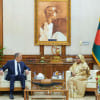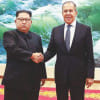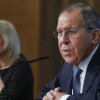Russian FM urges Trump-Kim 'kindergarten fight' end
Russia and China have both appealed for an end to the escalating rhetoric between Washington and Pyongyang, and Moscow’s Foreign Minister Sergei Lavrov complained that that scrap resembled a “kindergarten fight between children.”
“We have to calm down the hot heads and understand that we do need pauses, that we do need some contacts,” Lavrov told a news conference after his address to the General Assembly.
On the fringes of the world meeting, North Korean Foreign Minister Ri Yong-ho told reporters Pyongyang might now consider detonating a hydrogen bomb outside its territory.
“I think that it could be an H-bomb test at an unprecedented level perhaps over the Pacific,” he said — while adding: “It is up to our leader so I do not know well.”
Washington on Thursday authorized a tough new raft of sanctions in the latest effort to tighten the screws on Pyongyang over its banned weapons programs, following its sixth nuclear test — the largest yet — and the firing of two missiles over Japan in recent weeks.
Trump’s executive order, which prohibits firms from operating in the United States if they deal with North Korea, came after the UN Security Council agreed its own further set of sanctions aimed at reducing Pyongyang’s ability to trade with the outside world.
But analysts say the sanctions show no signs of working, and cautioned that the increasingly ill-tempered and personal exchanges between Washington and Pyongyang did not augur well.
“There are some very dangerous things that could come that move this from theater to reality. This is the time to be heading them off, not making them feel inevitable,” said John Delury of Yonsei University in Seoul.
Washington has refused to offer incentives to bring Pyongyang to the negotiating table, despite appeals to do so from China and Russia, who are both uneasy over Trump’s bellicose tone.
However, in a meeting with Japanese Prime Minister Shinzo Abe and South Korean President Moon Jae-in, Trump suggested the door to dialogue remained open.
“Why not?” he said, when asked whether there could be talks with Pyongyang.
China wields the most influence on North Korea, providing an economic lifeline. But it also fears the consequences if the regime collapses, such as an exodus of refugees or a US-allied, reunited Korea on its border.
“Negotiation is the only way out and deserves every effort,” Chinese Foreign Minister Wang Yi told the General Assembly.
The sentiments were echoed by Russian Foreign Minister Sergei Lavrov, who said “military hysteria is not just an impasse, it’s disaster.”
North Korean envoy Ri is expected to meet on Saturday with UN Secretary-General Antonio Guterres, who will send out feelers on possible diplomatic talks.
But Chung Sung-Yoon, analyst at the Korea Institute for National Unification, told AFP that the North itself may have shelved the idea of negotiations until it reaches its nuclear goal.
“People say this is all part of its brinkmanship strategy to force the US to come forward for negotiation. But the North is leaving too little room for the US to do so with the latest series of threats and provocations,” he said.

 For all latest news, follow The Daily Star's Google News channel.
For all latest news, follow The Daily Star's Google News channel. 







Comments